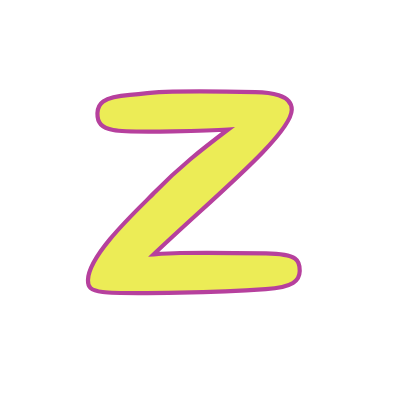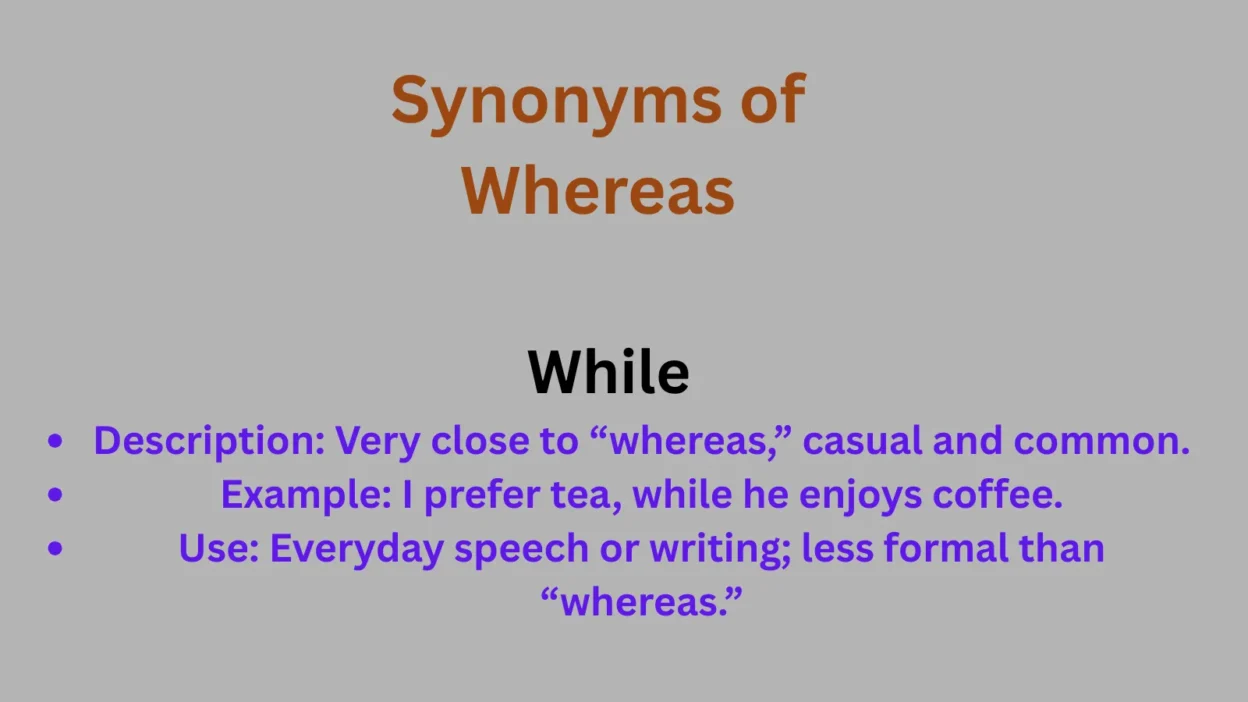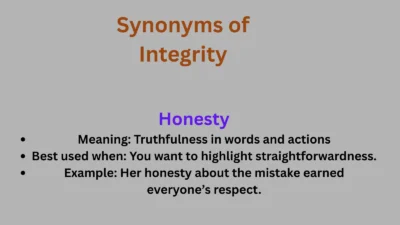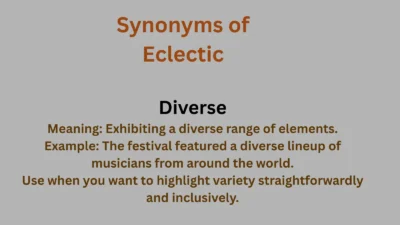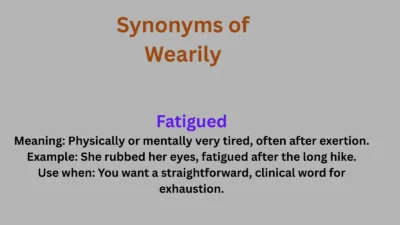Tired of repeating the word “whereas” in your writing? Whether you’re a student comparing ideas in an essay or a writer aiming for variety and clarity, using the same transition word too often can weaken your flow. That’s why it’s helpful to explore the best synonyms of whereas, including phrases like while, although, on the other hand, and in contrast.
In this article, we’ll walk you through the most common and effective synonyms of whereas, explain how they work in different contexts, and show you exactly when to use them.
If you’re writing comparisons, arguments, or contrasts, this guide is your shortcut to sharper writing. Let’s explore the words and phrases that do the job of “whereas,” but with more flexibility.
What Does Whereas Mean?
Whereas is a conjunction used to introduce a contrast or comparison between two ideas or facts. It’s often found in formal writing, contracts, essays, and debates where you want to highlight how two things differ or stand in opposition.
For example:
“She loves classical music, whereas he prefers jazz.”
Here, whereas neatly contrasts two preferences.
Key nuances of whereas include:
- It’s neutral and formal, not emotional or opinionated.
- It sets up a balanced comparison rather than an extreme opposition.
- It’s often used when you want to present two facts side by side clearly and concisely.
Unlike words that are dramatic or emotionally charged, whereas is modest, reserved, and straightforward—ideal for clear logical contrasts without flair or judgment.
Synonyms of Whereas and When to Use Them
Here’s a list of 30 alternatives to Whereas, each with a brief description, example, and tips on when it fits best.
1. While
- Description: Very close to “whereas,” casual and common.
- Example: I prefer tea, while he enjoys coffee.
- Use: Everyday speech or writing; less formal than “whereas.”
2. Although
- Description: Introduces a contrast, often unexpected.
- Example: Although it was raining, we went hiking.
- Use: When the contrast involves surprise or concession.
3. Though
- Description: Informal and flexible, often interchangeable with “although.”
- Example: She’s young, though very experienced.
- Use: Casual conversations or writing.
4. Whereas
- Description: Formal, balanced contrast.
- Example: He loves action movies, whereas she prefers comedies.
- Use: Formal documents, essays, debates.
5. But
- Description: Simple, direct contrast.
- Example: I like pizza, but I’m allergic to cheese.
- Use: Everyday language, informal tone.
6. On the other hand
- Description: Used to show an alternative or opposing viewpoint.
- Example: Cats are independent; on the other hand, dogs are loyal.
- Use: When presenting two sides of an argument.
7. Conversely
- Description: Formal, introduces an opposite idea.
- Example: She’s outgoing; conversely, her brother is shy.
- Use: Academic or professional writing for clear opposites.
8. In contrast
- Description: Formal, emphasizes a difference.
- Example: The north is cold; in contrast, the south is warm.
- Use: Essays, reports highlighting differences.
9. However
- Description: Formal, indicates contradiction or limitation.
- Example: The plan was ambitious; however, it failed.
- Use: When you want a softer contrast or exception.
10. Yet
- Description: Slightly formal, showing contrast but with a surprising element.
- Example: She’s tired, yet she keeps working.
- Use: Literary or thoughtful tones.
11. Nonetheless
- Description: Formal, indicating a concession despite what was said.
- Example: He was late; nonetheless, he completed the task.
- Use: When emphasizing persistence or contradiction.
12. Still
- Description: Informal, indicating a contrast or persistence.
- Example: It was cold, still we went swimming.
- Use: Casual speech or writing.
13. Whereas on the contrary
- Description: Emphasizes direct opposition.
- Example: He wanted to stay, whereas on the contrary, she wanted to leave.
- Use: Formal writing, highlighting sharp contrast.
14. As opposed to
- Description: Points out differences, often preferences.
- Example: She prefers the city, as opposed to him who likes the countryside.
- Use: Informal or formal, when comparing preferences.
15. Unlike
- Description: Directly highlights the difference.
- Example: Unlike her sister, she’s very organized.
- Use: Casual or formal, when contrasting two subjects.
16. In comparison
- Description: Neutral, focuses on comparing two things.
- Example: In comparison, the new model is faster.
- Use: Objective or neutral contrasts.
17. Alternatively
- Description: Presents an option or choice.
- Example: We could go to the beach; alternatively, we can visit the museum.
- Use: When suggesting different possibilities.
18. Albeit
- Description: Formal, means “although,” used to soften a statement.
- Example: He was tired, albeit happy.
- Use: Formal or literary contexts.
19. Despite the fact that
- Description: Emphasizes contrast with strong concession.
- Example: Despite the fact that it was raining, they played outside.
- Use: Formal writing with strong contrast.
20. Whereas instead
- Description: Combines “whereas” with “instead,” emphasizing replacement.
- Example: She chose to stay home, whereas instead, he went out.
- Use: Formal writing when stressing choice differences.
21. While on the other hand
- Description: Used in spoken or written discourse to show a counterpoint.
- Example: He loves sports, while on the other hand, she enjoys reading.
- Use: Informal or semi-formal settings.
22. At the same time
- Description: Shows two contrasting ideas happening simultaneously.
- Example: He’s confident and at the same time humble.
- Use: When balancing opposing qualities.
23. Though on the other hand
- Description: Combines concession and contrast.
- Example: Though he’s strict, on the other hand, he is fair.
- Use: Informal or conversational tone.
24. Rather than
- Description: Indicates preference or alternative.
- Example: She chose tea rather than coffee.
- Use: When comparing choices or preferences.
25. Conversely speaking
- Description: Formal, used to introduce a reverse point.
- Example: Conversely, the plan might not succeed.
- Use: Formal speeches or essays.
26. In any case
- Description: Indicates a return to the main point despite contrast.
- Example: It was expensive, but in any case, we bought it.
- Use: Informal to neutral tone.
27. Even though
- Description: Stronger than “although,” emphasizes contradiction.
- Example: Even though he was tired, he kept working.
- Use: When emphasizing determination despite obstacles.
28. Whereas alternatively
- Description: Emphasizes a direct alternative contrast.
- Example: He took the bus, whereas alternatively, she drove.
- Use: Formal writing.
29. Despite this
- Description: Shows contrast following a statement.
- Example: She was nervous. Despite this, she performed well.
- Use: Formal or narrative writing.
30. On the flip side
- Description: Informal, idiomatic, introduces a contrasting perspective.
- Example: I love working from home. On the flip side, I miss socializing.
- Use: Casual conversations or blog writing.
How to Choose the Right Synonym of Whereas
Selecting the best alternative depends on several factors:
- Tone: Formal documents favor words like whereas, however, conversely, or albeit. Casual speech leans on but, though, or on the flip side.
- Context: Use although and even though when the contrast is unexpected or surprising. For simple preferences, rather than or as opposed to work well.
- Emotional weight: Nonetheless or despite this, add a tone of persistence or concession, while but is neutral and straightforward.
- Cultural setting: Formal writing in legal or academic contexts almost always prefers whereas or in contrast. Informal settings enjoy idiomatic phrases like on the flip side.
- Clarity vs. style: If clarity is a priority, choose straightforward words like but or while. If you want elegance or literary flair, albeit or conversely, you are better.
Conclusion
When you’re writing comparisons, contrasts, or opposing ideas, using the right connector is key. The word whereas is useful, but relying on it too much can make your writing feel repetitive. That’s why learning the best synonyms of whereas—such as while, although, on the other hand, and in contrast—helps you sound smoother and more professional.
Whether you’re crafting essays or storytelling, these alternatives to Whereas give you flexibility and flow. The more synonyms of whereas you know, the more variety and clarity you bring to your writing.
Use them wisely, and your arguments or comparisons will stand out with confidence and precision.
